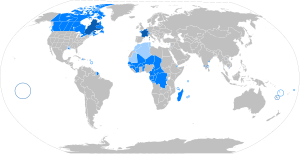Portal:French/What is French
French (le français [lə fʁɑ̃sɛ] (![]() listen) or la langue française [la lɑ̃ɡ fʁɑ̃sɛz]) is today spoken around the world by 72 to 130 million people as a native language, and by about 190 to 600 million people as a second or third language, with significant speakers in 54 countries. Most native speakers of the language live in France, where the language originated. The rest live in Canada, Belgium, Switzerland and Lebanon. It is an official language in 31 countries, most of which form what is called in French "La Francophonie": the community of French-speaking nations. It is an official language of all United Nations agencies and a large number of international organizations.
listen) or la langue française [la lɑ̃ɡ fʁɑ̃sɛz]) is today spoken around the world by 72 to 130 million people as a native language, and by about 190 to 600 million people as a second or third language, with significant speakers in 54 countries. Most native speakers of the language live in France, where the language originated. The rest live in Canada, Belgium, Switzerland and Lebanon. It is an official language in 31 countries, most of which form what is called in French "La Francophonie": the community of French-speaking nations. It is an official language of all United Nations agencies and a large number of international organizations.
French is a descendant of the Latin language, whose development was influenced by the native Celtic languages of Roman Gaul and by the Germanic language of the post-Roman Frankish invaders. Some might say that Latin is a "dead language", but unlike the endangered languages of today, Latin never even faced extinction. It was the commonly spoken language throughout the Roman Empire, and during the Empires decline, and after it's fragmentation in the fifth century, varieties, or dialects, began to diverge within each local area at an accelerated rate, evolving into similar, but different languages which we now know as the Romantic or Romance languages; not called so because speaking it makes you enthralled with love and romance, but because of it's origins with Rome (though the modern sense of the word "romance" does come from the same origin). It's difficult to determine the number of contemporary Romance languages in existence, but the largest by number of native speakers are Spanish (385 million), Portuguese (210 million), French (75 million), Italian (60 million), and Romanian (23 million)(Numbers from 2007 the five most widely spoken Romance languages by number of native speakers).[5] Many of these languages also have large numbers of non-native speakers; this is especially the case for French, in widespread use throughout the Maghreb, Central and West Africa and Madagascar.
Facts and Figures
editWhy learn French?
editFrance is considered by many to be the cosmopolitan center of the world. The French people have contributed substantially to art, literature, music, architecture, fashion, political thought, and film. Learning French allows you to access the rich culture and history of the French people.
In addition to access to France, French is an international language and the only language other than English that is spoken on five continents. It is the second most commonly taught language in the world, after English, and the official language of thirty nations. It is a working language of the United Nations, UNESCO, NATO, Organization for Economic Cooperation and Development, the International Labor Bureau, the International Olympic Committee, the International Red Cross, and many others. Learning French will give you the ability to communicate with people across the world.
Jobs Using French
edit- The French-speaking world accounts for approximately 19% of all global trade.
- France has the 5th largest economy in the world.[6]
- There are over 900,000 French-speaking teachers worldwide.
- French is the 3rd most widely used language on the internet.
- TV5MONDE is the 3rd largest international television market and is broadcast in 202 nations.
French and English
editSee Also
editReferences
edit- ↑ 1.0 1.1 French at Ethnologue (16th ed., 2009)
- ↑ Francophonie
- ↑ The World's 10 Most Influential Languages Top Languages. Retrieved 2011-04-11.
- ↑ La langue française dans le monde 2010. La Francophonie. Retrieved 2010-04-14.
- ↑ w:Nationalencyklopedin "Världens 100 största språk 2007" (The World's 100 Largest Languages in 2007), rounded off to the nearest 5M
- ↑ Nominal 2011 GDP for the world and the European Union (EU), accessdate=2012-04-17, World Economic Outlook Database, April 2012, publisher=International Monetary Fund
